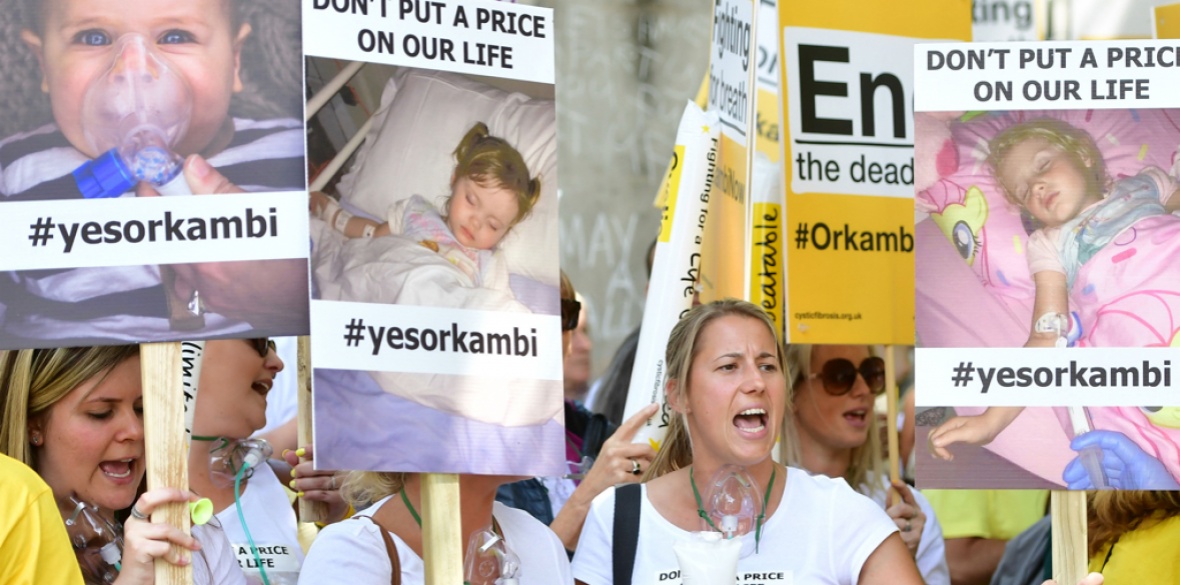This is the last article you can read this month
You can read more article this month
You can read more articles this month
Sorry your limit is up for this month
Reset on:
Please help support the Morning Star by subscribing here
IN 2016, when the European Medicines Agency approved Orkambi — a precision drug produced by pharmaceutical company, Vertex, which would help the 50 per cent of those with cystic fibrosis who have two copies of the F508 del mutation, it gave hope to the whole community, not just for this drug, but also for drugs in the pipeline that could help as many as 90 per cent of those with cystic fibrosis.
There was no doubt Orkambi was a game-changer. It effectively slows down the deterioration in lung function by up to 42 per cent and cuts admission to hospital due to infections by up to 61 per cent.
The National Institute for Health and Care Excellence (Nice) called it “important and effective” and approved it for use among “compassionate cases” where lung function had already deteriorated below 40 per cent.
However, at least 3,000 people would benefit from Orkambi, but after three years of negotiations between Vertex and NHS England, talks have broken down completely, with NHS England refusing to fund the drug on the basis of cost-effectiveness and lack of long-term data.
In turn, Vertex accused NHS England of “outrageous behaviour” and “not pursuing a solution strongly enough.”
Both sides have their own part to play in this failure. Vertex a multibillion-pound pharma company is charging a whopping £100,000 per patient, per year.
The NHS also doesn’t seem to have the right methodology to ascertain long-term benefits in patients who have chronic, life-limiting conditions.
Leadership from Heath Secretary Matt Hancock was required, but missing, and that might explain the omission of cystic fibrosis from the NHS Long Term Plan.
In the three years they have been negotiating, 220 people with this type of cystic fibrosis have died, many of whom were in their twenties and early thirties.
For parents of children with cystic fibrosis, which Orkambi could help, they feel they are watching their children decline before their eyes — a situation made all the more perverse when Orkambi is available in Europe for children from the age of two, which could dramatically change the course of the disease.
Nicola’s son George was gravely ill as a baby with a perforated bowel, that required emergency open-bowel surgery at four months, when he was severely malnourished.
Now at eight years old, he is a funny, caring and brave boy who likes his Lego, musicals, superheroes and ice cream.
He still has problems with his bowels and struggles to gain and maintain weight. His daily routine involves 30 minutes of physiotherapy in the morning, then taking medication, including liver salts and a drug called Creon with breakfast.
He has a supplement drink and before school has his nebuliser. At school with snacks and meals he also takes Creon, which the staff at school have to sign to ensure that this is administered and taken correctly.
In the evening he has vitamins and more liver salt with tea, then another 30 minutes of physiotherapy followed by another supplement drink. In addition to this, every other month he has a hospital appointment.
Despite this regime, in the last three years his lung function has decreased by 10 per cent.
Nicola is clear as to what Orkambi means for George: “Orkambi is a lifeline a light of hope. His lung function is around 90 per cent now. Orkambi would stabilise that.
“It gives us the ability to stop the clock on cystic fibrosis. It could mean his lung and liver health don’t deteriorate further, that he could gain and sustain weight without the need for supplements?”
Like Nicola, Laura’s daughter had severe problems as a baby. She was first in hospital two weeks after her first birthday. She was too underweight to get a line in, so had to have a general anaesthetic where they went through her chest.
Nowadays, like George, she has to take over 40 tablets, four nebulisers and two sessions pf physiotherapy a day.
It’s a gruelling regime and her daughter’s condition causes a lot of anxiety.
“The only thing that keeps me going,” Laura says, “is my absolute love for her, and the fact that she can still giggle when she on the fourth hour of treatments and she is happy just to be well enough to go to school.”
The mothers were dismayed and angered about the decision not to approve Orkambi. They were not alone as over 114,000 people signed a petition about Orkambi funding in just 10 days, which triggered a parliamentary debate.
In this debate, Rachel Maskell MP criticised the system devised by Nice: “Where only those whose lung function has deteriorated to such an extent are given the drug on ‘compassionate grounds’ is unethical and both economically and clinically illiterate to make Orkambi available to some people who are seriously deteriorating but not to those who could stop their lungs being damaged in the first place — if they had access to it in advance.”
However, the NHS is unlikely to have acted in this way had it not been for the extremely high list price of Orkambi from Vertex.
It may have a mission to treat up to per cent cystic fibrosis patients, but if the price is going to be too high for anything other than costly private insurance-based healthcare, we in Britain are in trouble as the NHS is simply not geared up for these new medications.
“To be denied these drugs by a CEO that is paid tens of millions each year is to watch your child suffer and head towards certain death,” Laura said, shaking her head.
“I hoped these drugs were coming, and all the suffering would pay off. That my daughter would realise her dreams, and I wouldn’t have to bury her.”
What everyone wants is to see both sides back at the negotiation table and for them to come to an agreement. The ramifications of continued stalemate are what Nicola and Laura fear the most.
As Nicola points out: “If the two sides can’t reach a deal, George’s lung function will decline, his liver will decline, his weight will decline, his health will decline, his quality of life will decline, and he will die early.”
Ruth F Hunt is a freelance journalist and author. To sign the petition visit petition.parliament.uk/petitions/231602.








